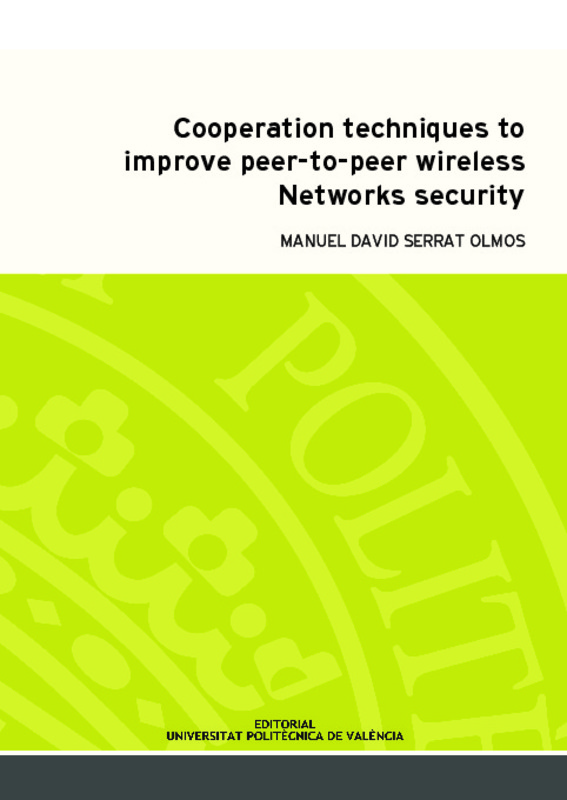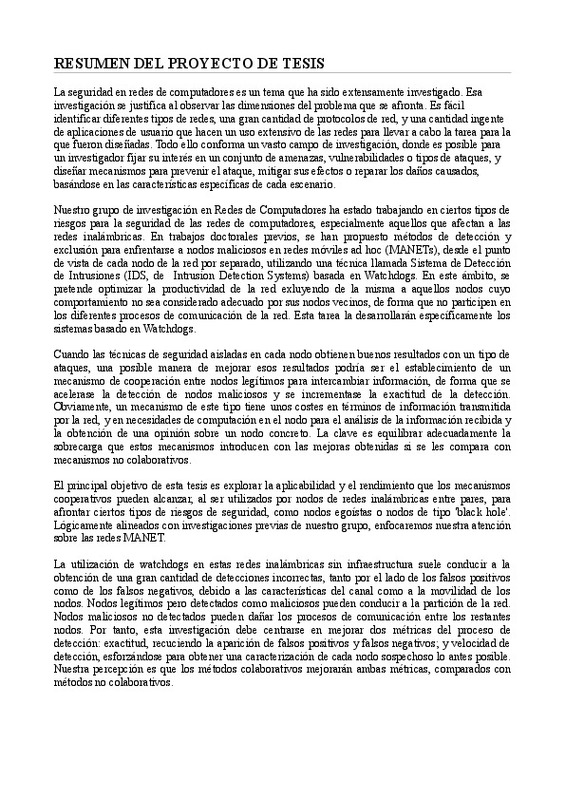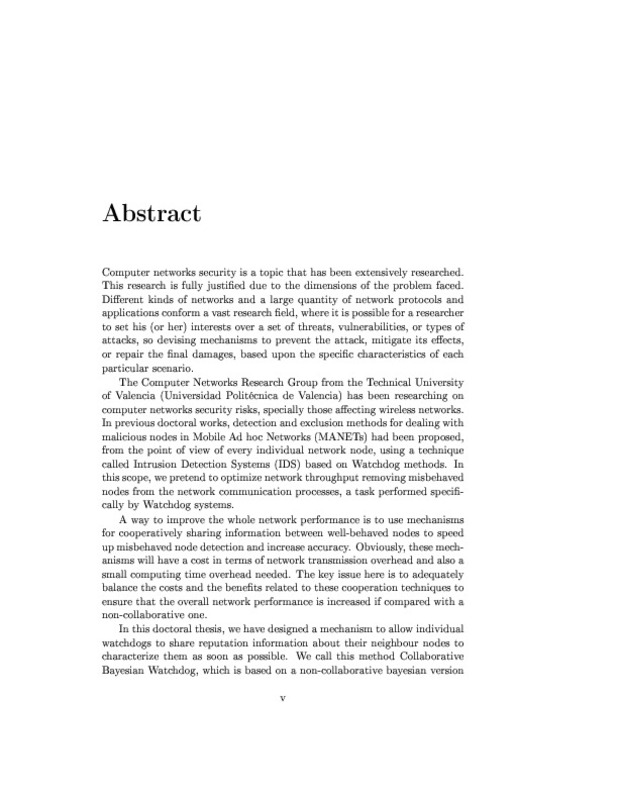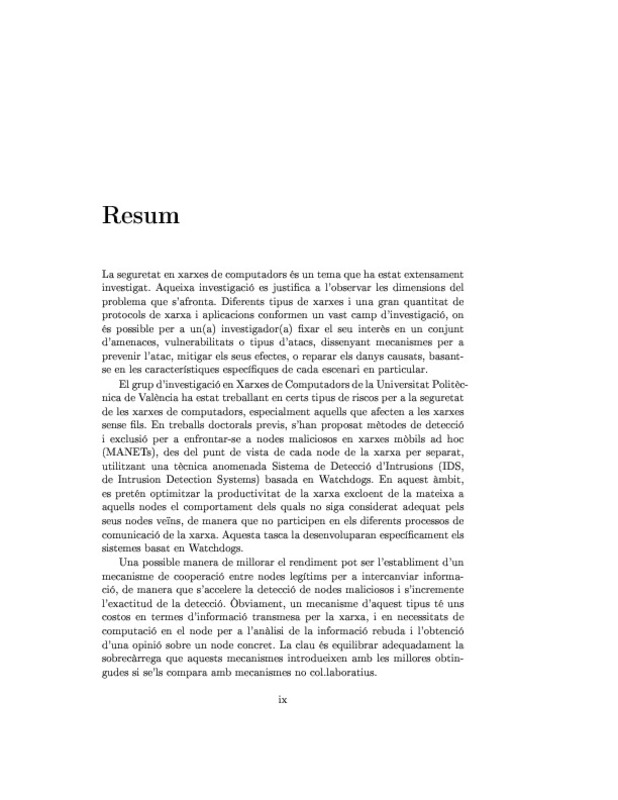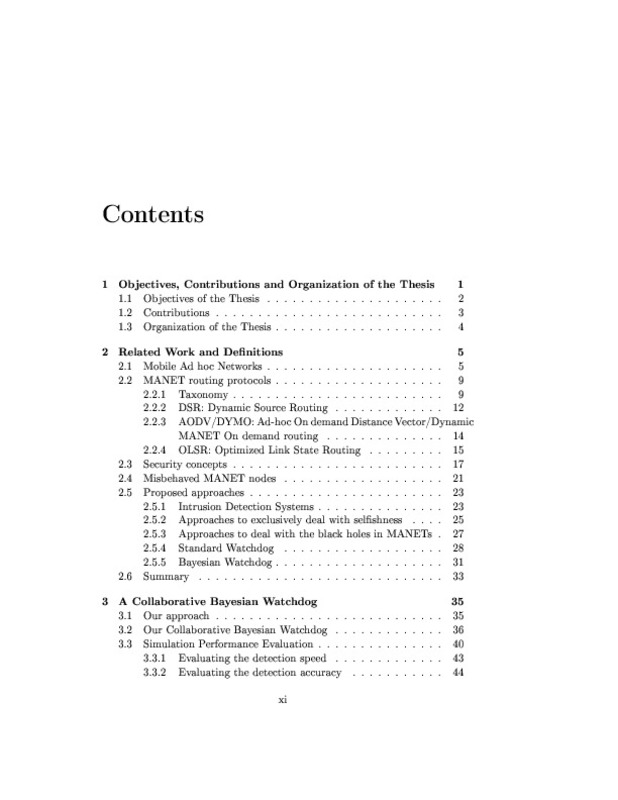- RiuNet repositorio UPV
- :
- Investigación
- :
- Tesis doctorales
- :
- Ver ítem
JavaScript is disabled for your browser. Some features of this site may not work without it.
Buscar en RiuNet
Listar
Mi cuenta
Estadísticas
Ayuda RiuNet
Admin. UPV
Cooperation techniques to improve peer-to-peer wireless networks security
Mostrar el registro sencillo del ítem
Ficheros en el ítem
| dc.contributor.advisor | Cano Escribá, Juan Carlos
|
es_ES |
| dc.contributor.advisor | Hernández Orallo, Enrique
|
es_ES |
| dc.contributor.author | Serrat Olmos, Manuel David
|
es_ES |
| dc.date.accessioned | 2013-10-15T07:19:05Z | |
| dc.date.available | 2013-10-15T07:19:05Z | |
| dc.date.created | 2013-09-27T10:00:25Z | es_ES |
| dc.date.issued | 2013-10-15T07:19:02Z | es_ES |
| dc.identifier.isbn | 978-84-9048-136-3 | |
| dc.identifier.uri | http://hdl.handle.net/10251/32831 | |
| dc.description.abstract | Computer networks security is a topic which has been extensively researched. This research is fully justified when one notices the dimensions of the problem faced. One can easily identify different kinds of networks, a large quantity of network protocols, and an overwhelming amount of user applications that make extensive use of networks for the purposes those applications were built. This conforms a vast research field, where it is possible for a researcher to set his or her interests over a set of threats, vulnerabilities, or types of attacks, and devise a mechanism to prevent the attack, mitigate its effects or repair the final damages, based upon the specific characteristics of the scenario. Our research group on Computer Networks has been researching on certain kinds of computer networks security risks, specially those affecting wireless networks. In previous doctoral works [13], detection and exclusion methods for dealing with malicious nodes in mobile ad hoc networks (MANETs) had been proposed, from the point of view of every individual network node, using a technique called Intrusion Detection Systems (IDS) based on Watchdog methods. In this scope, we pretend to optimize network throughput removing misbehaved nodes from the network communication processes, a task performed specifically by the Watchdog systems. When isolated security techniques obtain good results on dealing with one type of attacks, a way to improve the whole network performance could be establishing mechanisms for cooperatively sharing information between well-behaved nodes to speed up misbehaved node detection and increase accuracy. Obviously, these mechanisms will have a cost in terms of network transmission overhead and also a small computing time overhead needed to analize the received data and to obtain an opinion about a suspect node. The key issue here it to adequately balance the costs and the benefits related to these cooperation techniques to ensure that the overall network performance is increased if compared with a non-collaborative one. | es_ES |
| dc.language | Inglés | es_ES |
| dc.publisher | Editorial Universitat Politècnica de València | es_ES |
| dc.rights | Reserva de todos los derechos | es_ES |
| dc.source | Riunet | es_ES |
| dc.subject | Watchdog | es_ES |
| dc.subject | Bayesian Filters | es_ES |
| dc.subject | Community Networks | es_ES |
| dc.subject | Security | es_ES |
| dc.subject | Analytical model | es_ES |
| dc.subject | MANET | es_ES |
| dc.subject | DTN | es_ES |
| dc.subject | Cooperative techniques | es_ES |
| dc.subject.classification | ARQUITECTURA Y TECNOLOGIA DE COMPUTADORES | es_ES |
| dc.title | Cooperation techniques to improve peer-to-peer wireless networks security | |
| dc.type | Tesis doctoral | es_ES |
| dc.identifier.doi | 10.4995/Thesis/10251/32831 | es_ES |
| dc.rights.accessRights | Abierto | es_ES |
| dc.contributor.affiliation | Universitat Politècnica de València. Departamento de Sistemas Informáticos y Computación - Departament de Sistemes Informàtics i Computació | es_ES |
| dc.description.bibliographicCitation | Serrat Olmos, MD. (2013). Cooperation techniques to improve peer-to-peer wireless networks security [Tesis doctoral]. Editorial Universitat Politècnica de València. https://doi.org/10.4995/Thesis/10251/32831 | es_ES |
| dc.description.accrualMethod | TESIS | es_ES |
| dc.type.version | info:eu-repo/semantics/acceptedVersion | es_ES |
| dc.relation.tesis | 8708 | es_ES |
Este ítem aparece en la(s) siguiente(s) colección(ones)
-
Tesis doctorales [5347]
-
Tesis. Editorial UPV [172]






